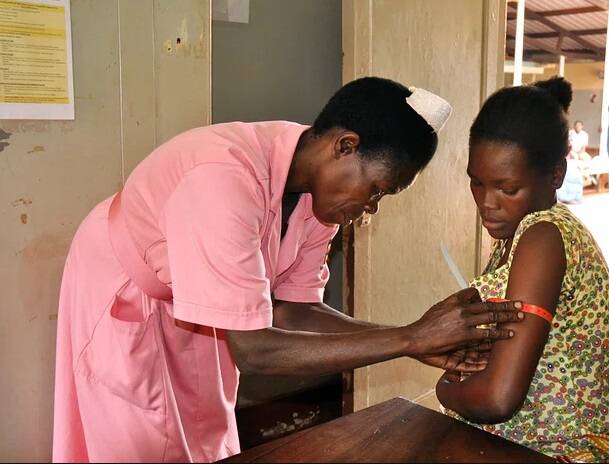
About Health Initiatives
Health initiatives refer to programs and interventions aimed at improving and protecting the health and well-being of individuals and communities. These initiatives can encompass a wide range of areas, including:
Preventive Health:
- Immunization: Promoting and administering vaccines to prevent infectious diseases.
- Health education: Providing information and resources to empower individuals to make healthy choices.
- Screening programs: Identifying and detecting health conditions early on, such as cancer and diabetes.
WLVNA HEALTH INITIATIVE PROGRAM

Protecting the health of children in our communities involves educating parents about the importance of immunization. The Nigerian government has introduced several reforms aimed at ensuring sustainable funding for primary healthcare services, including vital immunization programs.

As women grow older, they face an increased likelihood of developing chronic conditions such as arthritis, osteoporosis, and heart disease. They may also experience multiple health challenges and cognitive difficulties. To support their overall health, it’s essential to adopt a healthy lifestyle that includes nutritious eating, consistent physical activity, and sufficient restful sleep.

Our mission is to care for the well-being of the entire family. For the men in our communities, we aim to emphasize the importance of prioritizing their health, particularly by addressing concerns like prostate health and cardiovascular care.

WOMEN'S HEALTH
Women's health encompasses a diverse range of aspects, from reproductive and maternal health to chronic diseases and mental well-being. It is crucial to recognize the unique challenges that women face, including hormonal fluctuations, pregnancy, childbirth, and menopause. Furthermore, women are often at higher risk for conditions such as breast cancer, osteoporosis, and autoimmune diseases. Access to quality healthcare, education, and support is essential for empowering women to maintain their health and well-being.
Childhood Cancer
Childhood cancer refers to cancers that occur in children and adolescents. Unlike adult cancers, which are often linked to lifestyle and environmental factors, childhood cancers are typically caused by genetic mutations. The most common types include leukemia, brain and spinal cord tumors, neuroblastoma, and lymphoma. Early diagnosis and treatment are crucial for improving the survival rates and quality of life for young patients. Advances in medical research and treatment protocols have significantly increased survival rates over the years. However, the journey through diagnosis, treatment, and recovery can be challenging for both the child and their family, highlighting the importance of comprehensive care, support systems, and ongoing research to find better therapies and ultimately a cure.
OUR HEALTH IS OUR WEALTH
Health is Wealth is more than a proverb—it’s a truth that shapes the quality of our lives. When we invest in our physical, mental, and emotional well-being, we create the foundation for success, happiness, and longevity. Good health allows us to pursue our goals with energy, nurture relationships with joy, and face challenges with resilience. Just as financial wealth provides security, health provides freedom—the freedom to live fully, dream boldly, and contribute meaningfully to our communities. By prioritizing healthy choices today, we safeguard the most valuable asset we will ever own: ourselves.

Global Diabetes: Awareness saves lives, prevention starts today.
More than 95% of diabetes cases are type 2, which happens when the body can’t use insulin properly — and in many cases, it can be prevented.
Here’s how to help prevent type 2 diabetes:
Maintain a healthy body weight.
At least 150 minutes of moderate exercise each week.
Eat a balanced diet while limiting sugar and saturated fats.
Avoid tobacco use.
Symptoms can develop slowly and may go unnoticed for years, making regular screening and early testing essential.
Common symptoms of diabetes include:
- Feeling very thirsty
- Needing to urinate more often than usual
- Feeling tired
- Blurred vision
- Unexplained weight loss

🩺 Health as a Brand Pillar
- Programs: WLVNA plans to partner with healthcare initiatives (like Carehafrica.org) to promote training and awareness for health practitioners.
- Messaging: Focuses on the idea that empowered women must also be healthy women, tying wellness to sustainability.
- Visuals: Incorporating health symbols (hearts, wellness icons, green tones) alongside cultural motifs in flyers.
- Event Tie-ins: Health screenings, wellness talks, and fundraising for medical outreach are branded as “Care for today, strength for tomorrow.”


